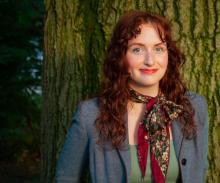Fellowship Creates Space for Community-Centered Work

Career exploration is time-consuming. For Heather Ennis, this period of discernment has been a slow, necessary evolution—one that has provided an opportunity for self-reflection about her graduate education in the humanities.
“I don't think that doing a PhD and deciding not to follow an academic track is necessarily the kind of loss that maybe I perhaps thought it was when I first started [my] program,” said Ennis, a PhD candidate in the English Department and a member of the Career Exploration Fellowship Program’s inaugural cohort at the University of Illinois Urbana-Champaign. “People frame career diversity as sort of a second-best option, not looking at it as it is—a really positive force.”
The Career Exploration Fellowship Program, supported by the Graduate College, was designed to connect doctoral students with administrative units, enabling the students to build knowledge and skills beyond traditional research and teaching roles, as well as envision alternative career paths from a wider spectrum of opportunities. During her fellowship semester at the Humanities Research Institute (HRI), Ennis collaborated closely with the Humanities Without Walls (HWW) team on consortium projects related to seed grant funding, interdisciplinary research project recruitment cycles, and writing for non-academic audiences.
A Victorianist by training, Ennis’s research focused on the British Arts and Crafts movement and late Victorian socialist movements, with an emphasis on labor and embracing beauty in everyday life. Because these topics are important to Ennis, she also wanted to broaden her experience by drawing connections to contemporary concerns outside of the ivory tower.
To engage in these community-based projects, Ennis first had to get re-acclimated to the humanities community, both literally and figuratively. To her surprise, being in a physical office space with co-workers at HRI—a new experience for Ennis, who previously had only held academic-based jobs—created a sense of renewed motivation.
Ennis was also introduced to HWW’s research methodologies of reciprocity and redistribution. These frameworks underpin the consortium’s on-going dialogue about career diversity and the future of humanities graduate education. HWW champions career agnosticism and acknowledges that career diversity is not an emergent trend. Academics in precarious positions have, out of necessity, had to forge viable pathways in settings both parallel—and external to—colleges and universities. For Ennis, the fellowship enabled her to theorize and articulate long-held viewpoints about persisting within (and reforming) the academy.
“People are having to acknowledge that there's instability in the system,” she said. “I understand that it feels like a loss. But it's existed for people lower down in the system for a long time.”
Communicating these ideas required Ennis to adapt to writing for a primarily non-academic audience. She worked alongside HWW team members to tell stories about the consortium’s impact. During this process, Ennis brainstormed questions, conducted interviews, and drafted pieces about past-funded projects, including a story about the Hmong community. Throughout her experience, Ennis marveled at the variety of rich career trajectories and diverse experiences represented in each story.
“This fellowship has made it clear to me that I could find happiness outside of academia,” Ennis said. “People do so many different interesting things that I could find very fulfilling. It's kind of thrilling.”